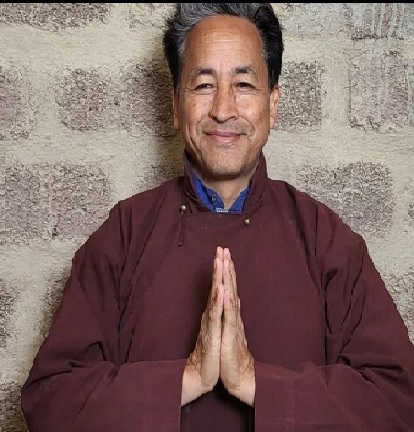Support Sonam Wangchuk an Environment Worrier
Sonam Wangchuk, a prominent figure hailing from the picturesque region of Ladakh in India, has long been recognized for his groundbreaking work in education, sustainability, and community development. Wangchuk’s innovative approaches have earned him global acclaim, with his efforts focusing on harnessing local resources and wisdom to address the unique challenges faced by Ladakh and similar mountainous regions.

Sonam Wangchuk’s journey towards becoming a symbol of change in Ladakh began with his pioneering work in education. He established the Students’ Educational and Cultural Movement of Ladakh (SECMOL) in 1988, aiming to reform the traditional rote-learning methods prevalent in the region’s schools. SECMOL introduced alternative teaching techniques that emphasized practical learning and critical thinking, empowering students to become active participants in their own education.
Beyond education, Sonam Wangchuk’s passion for environmental sustainability led him to develop innovative solutions to address Ladakh’s pressing issues, such as water scarcity and climate change. One of his most notable inventions is the Ice Stupa, a method of artificial glacier construction that stores winter runoff water in the form of conical ice structures. These Ice Stupas melt gradually during the spring months, providing a vital water source for agriculture and communities downstream.
However, despite his significant contributions, Wangchuk has been increasingly alarmed by the persistent challenges facing Ladakh. Rapid urbanization, infrastructure deficiencies, and environmental degradation threaten the fragile ecosystem and the well-being of its inhabitants. In response, Wangchuk took a bold and unconventional step to draw attention to these issues: he initiated a hunger strike.
Wangchuk’s decision to embark on a hunger strike was a poignant yet calculated move to raise awareness and provoke action on Ladakh’s challenges. By putting his own health on the line, he sought to compel authorities and policymakers to prioritize the needs of Ladakh’s people and environment. His hunger strike became a rallying cry for change, attracting widespread attention from both national and international media outlets.

Throughout his hunger strike, Wangchuk remained resolute in his commitment to his cause, refusing to eat until concrete steps were taken to address Ladakh’s issues. His determination and self-sacrifice struck a chord with people around the world, inspiring solidarity and support for his cause.
Ultimately, Wangchuk’s hunger strike served as a powerful reminder of the urgency of the situation in Ladakh and the importance of collective action in effecting meaningful change. While his protest may have ended, his legacy as a tireless advocate for the people and the environment of Ladakh continues to inspire generations to come. As Wangchuk once said, “In a world that’s constantly changing, the only strategy that is guaranteed to fail is not taking risks.” And with his hunger strike, he has taken one of the most daring risks of all, for the betterment of his beloved Ladakh.
Therefore, we urge you to lend your support to Sonam Wangchuk’s cause in any way you can:
Raise Awareness:
Spread the word about Sonam Wangchuk’s hunger strike and Ladakh’s challenges through social media, community events, and grassroots campaigns. Use your voice to shine a spotlight on these critical issues.
Advocate for Change:
Contact policymakers and government officials to demand concrete actions to address Ladakh’s needs. Write letters, make phone calls, and participate in advocacy efforts to ensure that Ladakh receives the attention and resources it deserves.
Donate:
Contribute to organizations and initiatives that are working to support Ladakh’s sustainable development and environmental conservation efforts. Every donation, no matter how small, can make a difference in improving the lives of Ladakhi communities.
Show Solidarity:
Express your support for Sonam Wangchuk and the people of Ladakh through messages of encouragement, solidarity rallies, and peaceful demonstrations. Let them know that they are not alone in their struggle for a better future.
Now is the time to stand together and stand up for Ladakh. Let us heed Wangchuk’s call to action and work tirelessly to ensure that Ladakh’s unique heritage, natural beauty, and way of life are preserved for generations to come.













